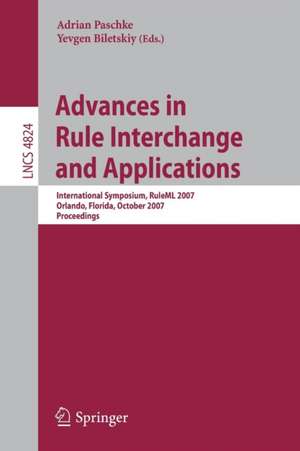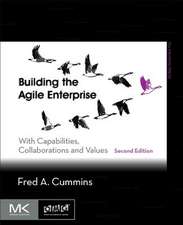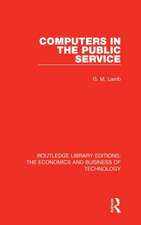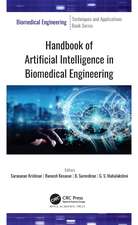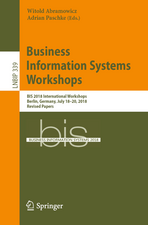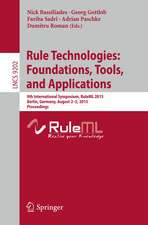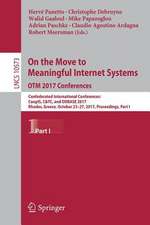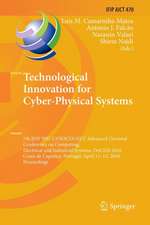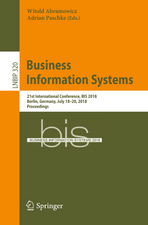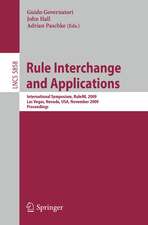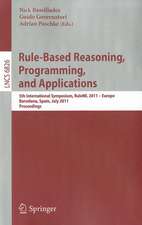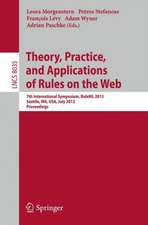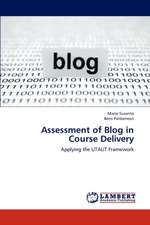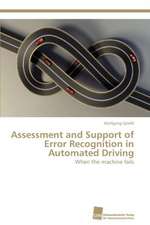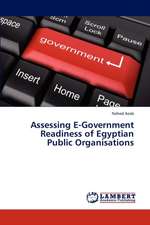Advances in Rule Interchange and Applications: International Symposium, RuleML 2007, Orlando, Florida, October 25-26, 2007, Proceedings: Lecture Notes in Computer Science, cartea 4824
Editat de Adrian Paschke, Yevgen Biletskiyen Limba Engleză Paperback – 15 oct 2007
Din seria Lecture Notes in Computer Science
- 20%
 Preț: 1061.55 lei
Preț: 1061.55 lei - 20%
 Preț: 307.71 lei
Preț: 307.71 lei - 20%
 Preț: 438.69 lei
Preț: 438.69 lei - 20%
 Preț: 645.28 lei
Preț: 645.28 lei -
 Preț: 410.88 lei
Preț: 410.88 lei - 15%
 Preț: 580.46 lei
Preț: 580.46 lei - 17%
 Preț: 427.22 lei
Preț: 427.22 lei - 20%
 Preț: 596.46 lei
Preț: 596.46 lei -
 Preț: 449.57 lei
Preț: 449.57 lei - 20%
 Preț: 353.50 lei
Preț: 353.50 lei - 20%
 Preț: 1414.79 lei
Preț: 1414.79 lei - 20%
 Preț: 309.90 lei
Preț: 309.90 lei - 20%
 Preț: 583.40 lei
Preț: 583.40 lei - 20%
 Preț: 1075.26 lei
Preț: 1075.26 lei - 20%
 Preț: 310.26 lei
Preț: 310.26 lei - 20%
 Preț: 655.02 lei
Preț: 655.02 lei - 20%
 Preț: 580.93 lei
Preț: 580.93 lei - 20%
 Preț: 340.32 lei
Preț: 340.32 lei - 18%
 Preț: 938.83 lei
Preț: 938.83 lei - 20%
 Preț: 591.51 lei
Preț: 591.51 lei - 15%
 Preț: 438.59 lei
Preț: 438.59 lei - 20%
 Preț: 337.00 lei
Preț: 337.00 lei -
 Preț: 389.48 lei
Preț: 389.48 lei - 20%
 Preț: 607.39 lei
Preț: 607.39 lei - 20%
 Preț: 1024.44 lei
Preț: 1024.44 lei - 20%
 Preț: 579.30 lei
Preț: 579.30 lei - 20%
 Preț: 763.23 lei
Preț: 763.23 lei - 20%
 Preț: 453.32 lei
Preț: 453.32 lei - 20%
 Preț: 575.48 lei
Preț: 575.48 lei - 20%
 Preț: 585.88 lei
Preț: 585.88 lei - 20%
 Preț: 825.93 lei
Preț: 825.93 lei - 20%
 Preț: 763.23 lei
Preț: 763.23 lei - 17%
 Preț: 360.19 lei
Preț: 360.19 lei - 20%
 Preț: 1183.14 lei
Preț: 1183.14 lei - 20%
 Preț: 340.32 lei
Preț: 340.32 lei - 20%
 Preț: 504.57 lei
Preț: 504.57 lei - 20%
 Preț: 369.12 lei
Preț: 369.12 lei - 20%
 Preț: 583.40 lei
Preț: 583.40 lei - 20%
 Preț: 343.62 lei
Preț: 343.62 lei - 20%
 Preț: 350.21 lei
Preț: 350.21 lei - 20%
 Preț: 764.89 lei
Preț: 764.89 lei - 20%
 Preț: 583.40 lei
Preț: 583.40 lei - 20%
 Preț: 649.49 lei
Preț: 649.49 lei - 20%
 Preț: 341.95 lei
Preț: 341.95 lei - 20%
 Preț: 238.01 lei
Preț: 238.01 lei - 20%
 Preț: 538.29 lei
Preț: 538.29 lei
Preț: 331.40 lei
Preț vechi: 414.26 lei
-20% Nou
Puncte Express: 497
Preț estimativ în valută:
63.41€ • 66.21$ • 52.48£
63.41€ • 66.21$ • 52.48£
Carte tipărită la comandă
Livrare economică 04-18 aprilie
Preluare comenzi: 021 569.72.76
Specificații
ISBN-13: 9783540759744
ISBN-10: 3540759743
Pagini: 260
Ilustrații: XI, 248 p.
Dimensiuni: 155 x 235 x 14 mm
Greutate: 0.39 kg
Ediția:2007
Editura: Springer Berlin, Heidelberg
Colecția Springer
Seriile Lecture Notes in Computer Science, Programming and Software Engineering
Locul publicării:Berlin, Heidelberg, Germany
ISBN-10: 3540759743
Pagini: 260
Ilustrații: XI, 248 p.
Dimensiuni: 155 x 235 x 14 mm
Greutate: 0.39 kg
Ediția:2007
Editura: Springer Berlin, Heidelberg
Colecția Springer
Seriile Lecture Notes in Computer Science, Programming and Software Engineering
Locul publicării:Berlin, Heidelberg, Germany
Public țintă
ResearchCuprins
Invited Papers.- How Ontologies and Rules Help to Advance Automobile Development.- Are Your Rules Online? Four Web Rule Essentials.- Session: Business Process, Policy and IT Service Management and Modeling.- KISS – Knowledge-Intensive Service Support: An Approach for Agile Process Management.- Specifying Process-Aware Access Control Rules in SBVR.- A Rule-Based Approach to Prioritization of IT Work Requests Maximizing Net Benefit to the Business.- Session: Rule Languages and Interchange Standards.- A Generic Module System for Web Rule Languages: Divide and Rule.- Towards Semantically Grounded Decision Rules Using ORM?+?.- Towards Ontological Commitments with ?-RIDL Markup Language.- Session: Business Rules, Rule Engines and Applications.- Recovering Business Rules from Legacy Source Code for System Modernization.- An Approach for Bridging the Gap Between Business Rules and the Semantic Web.- Take - A Rule Compiler for Derivation Rules.- Session: RuleML-2007 Challenge.- The OO jDREW Engine of Rule Responder: Naf Hornlog RuleML Query Answering.- Querying the Semantic Web with SWRL.- Implementation of Production Rules for a RIF Dialect: A MISMO Proof-of-Concept for Loan Rates.- Session: Rules, Reasoning, and Ontologies.- Adapting the Rete-Algorithm to Evaluate F-Logic Rules.- Rule Definition for Managing Ontology Development.- Integrating Rules and Description Logics with Circumscription for the Semantic Web.- XML Data Compatibility from the Ground Up.- Session: Reaction Rules and Rule Applications.- Exploiting E-C-A Rules for Defining and Processing Context-Aware Push Messages.- The Use of Ontologies and Rules to Assist in Academic Advising.- Towards Knowledge Extraction from Weblogs and Rule-Based Semantic Querying.- Complex Information Management Using aFramework Supported by ECA Rules in XML.- AIM: An XML-Based ECA Rule Language for Supporting a Framework for Managing Complex Information.
